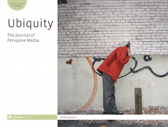- Home
- A-Z Publications
- Ubiquity: The Journal of Pervasive Media
- Previous Issues
- Volume 6, Issue 1, 2019
Ubiquity: The Journal of Pervasive Media - Volume 6, Issue 1, 2019
Volume 6, Issue 1, 2019
-
-
Searching for an OxChain: Co-designing blockchain applications for charitable giving
More LessAuthors: Chris Elsden, Kate Symons, Chris Speed, John Vines and Anne SpaaAbstractThe OxChain project is investigating the design of blockchain applications in partnership with a large and traditionally trusted institution, Oxfam. We outline some of the potential opportunities that distributed ledger technologies could offer the charity and development sector as a whole, but focus on the challenges of undertaking co-design work in the context of large institutions. We suggest the need to leverage existing trusted relationships and understand the unique value that such institutions offer.
-
-
-
Cloud Euphoria✿: A post-analysis on the networked effects of emotions
More LessAbstractNowadays we live in a maze of perplexity and contradiction, treating feelings as data, like augmenting them, compress them, duplicating them and erasing them. Data like 'happiness' or 'sadness' are becoming abstractions because there is never a single moment when we can explicitly feel one or another. Let us click into these 'files' and explore these techno-cultural forms of communicational imperfection.
-
-
-
Tangibly understanding intangible complexities: Designing for distributed autonomous organizations
More LessAuthors: Bettina Nissen, Ella Tallyn and Kate SymonsAbstractNew digital technologies such as Blockchain and smart contracting are rapidly changing the face of value exchange, and present new opportunities and challenges for designers. Designers and data specialists are at the forefront of exploring new ways of exchanging value, using Blockchain, cryptocurrencies, smart contracting and the direct exchanges between things made possible by the Internet of Things (Tallyn et al. 2018; Pschetz et al. 2019). For researchers and designers in areas of Human Computer Interaction (HCI) and Interaction Design to better understand and explore the implications of these emerging and future technologies as Distributed Autonomous Organisations (DAOs) we delivered a workshop at the ACM conference Designing Interactive Systems (DIS) in Edinburgh in 2017 (Nissen et al. 2017). The workshop aimed to use the lens of DAOs to introduce the principle that products and services may soon be owned and managed collectively and not by one person or authority, thus challenging traditional concepts of ownership and power. This workshop builds on established HCI research exploring the role of technology in financial interactions and designing for the rapidly changing world of technology and value exchange (Kaye et al. 2014; Malmborg et al. 2015; Millen et al. 2015; Vines et al. 2014). Beyond this, the HCI community has started to explore these technologies beyond issues of finance, money and collaborative practice, focusing on the implications of these emerging but rapidly ascending distributed systems in more applied contexts (Elsden et al. 2018a). By bringing together designers and researchers with different experiences and knowledge of distributed systems, the aim of this workshop was two-fold. First, to further understand, develop and critique these new forms of distributed power and ownership and second, to practically explore how to design interactive products and services that enable, challenge or disrupt existing and emerging models.
-
-
-
Decentralized Autonomous Housing
More LessAuthors: Tolulope Onabolu and Eleni MargaritiAbstractDecentralized Autonomous Organizations (DAOs) offer to disrupt all existing business models from derivatives trading to real estate, public services procurement and housing. This presents a unique opportunity for architects and urban designers to reshape the built environment by collectively engaging with finance generally, but also with alternative financial mechanisms, ahead of developers and investment companies who are less motivated by the quality of the built environment.
-
-
-
Emerging regimes of value in distributed autonomous systems
More LessAbstractThis position article brings together perspectives from social sciences, computer science and economy to interrogate the emerging meanings of value produced by Distributed Autonomous Organizations (DAO). We explore this process in the context of the wider political economy enabled by Distributed Ledger Technologies (DLT) and Smart Contracts (SC). The article then questions the ways in which the current implementations of DAO reflect the various regimes of value and the emergent possibilities to rethink the social contract.
-
-
-
Trustless education? A blockchain system for university grades1
More LessAuthors: John Rooksby and Kristiyan DimitrovAbstractWe have implemented a blockchain system based on Ethereum for use by a university to store student grades and to provide a cryptocurrency. Based upon an exploratory, qualitative evaluation we have found several tensions between the concept of a university as an organization and the concept of distributed autonomous organizations (DAOs) in Ethereum. These include tensions in (i) mechanisms of trust, (ii) boundaries of openness and (iii) values in procedures. In this article we outline our implementation and the evaluation process.
-
Most Read This Month

Most Cited Most Cited RSS feed
-
-
24 Frames 24 Hours
Authors: Max R. C. Schleser and Tim Turnidge
-
- More Less

